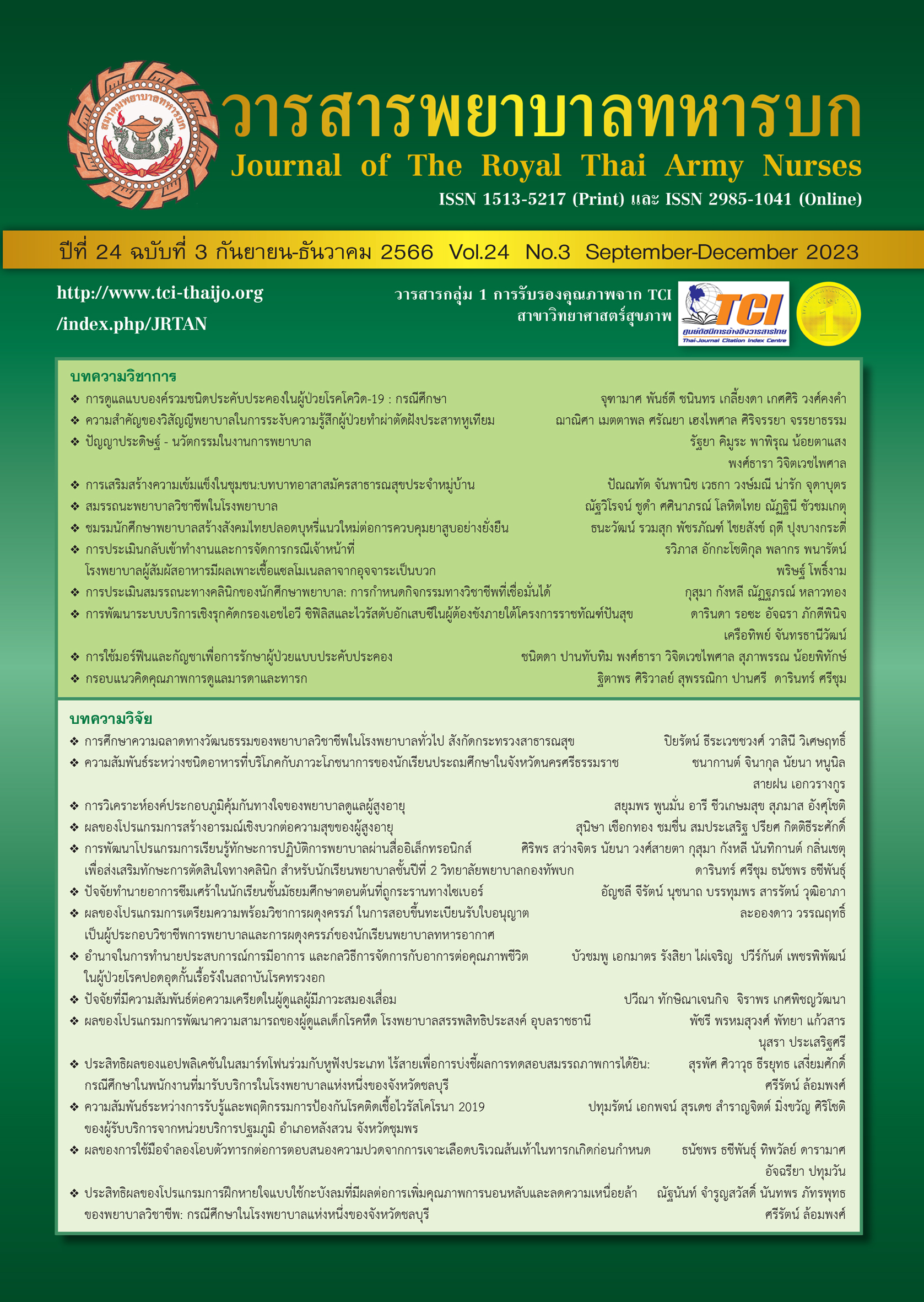The Relationship between Type of Food Consumption and Nutrition Status in Primary School Student in Nakhon Si Thammarat Province
Keywords:
Food Consumption, Nutritional status, primary school studentsAbstract
Good nutritional status affects primary school students’ health and development. In contrast, malnutrition, including undernutrition and overnutrition, is leading to serious public health issues. Malnutrition problems, especially among primary school students, are more likely to increase rapidly and continuously. Its causes are many related factors, such as genetics, family, environment, and consumption behaviors. However, the crucial cause of malnutrition is unhealthy food consumption, which includes eating less fiber as well as consuming high-fat foods, carbohydrate and sugary foods, junk foods, and sweetened beverages. These foods are significantly related to the nutritional status of primary school students.
Downloads
References
Bureau of Nutrition, Department of Health, Annual Report 2021. Nonthaburi: Ministry of Public Health. (in Thai)
World Health Organization. WHO Child Growth Standards. Report of WHO consultation. Retrieved February, 2016.
World Health Organization. Child Malnutrition Estimates, 2020. The committee and working group improve the daily dietary requirements for Thai people.The recommended daily intake of nutrients for Thai people. Bangkok: Bureau of Nutrition, Department of Health, Ministry of Public Health, 2020. (in Thai)
Rojroongwasinkul N, Kijboonchoo K, Wimonpeerapattana W, Purttiponthanee S, Yamborisut U, Boonpraderm A, ... & Khouw I. SEANUTS: the nutritional status and dietary. intakes of 0.5–12-year-old Thai children. British Journal of Nutrition 2013; 110(S3), S36-44. (in Thai)
Bureau of Nutrition, Department of Health, Ministry of Public Health. Guidelines for promoting and preventing nutritional status. Nonthaburi: Ministry of Public Health, 2019. (in Thai)
Strategic Plan for a healthy Thai lifestyle. (2011-2020). National Health Development Plan No. 11, Office Permanent Secretary, Ministry of Public Health. (in Thai)
Nakhon Si Thammarat Provincial, Public Health Office. School Health Information. Nakhon Si Thammarat: Ministry of Public Health, 2017. (in Thai)
Nakhon Si Thammarat Provincial. Public Health Office. Promoting and preventing nutrition work. Nakhon Si Thammarat: Ministry of Public Health, 2020. (in Thai)
Numpool J. Obesity in school-age children: the role of community medicine nurses in promoting health. Journal of Thai Red Cross Society Nurses 2015; 8(2), 3-7. (in Thai)
Chavaphan S. and Sritanon T. Health empowerment in children with obesity. Journal of Nursing and Education 2018; 11(1), 2-6. (in Thai)
Choengkhunthod S. et al. Knowledge and food consumption behavior of people in Phasi Charoen zones, Bangkok. In a research report of the Office of the Health Promotion Foundation (Thai Health Promotion Foundation) (pp. 1-71). Bangkok: Office of the Health Promotion Foundation, 2013. (in Thai)
Thipwong A. and Numpool J. Relationship between obesity-related health intelligence and diet behavior and exercise in children with overnutrition in Bangkok. Journal of Public Health Nursing, 2016; 28 (2), 1-11. (in Thai)
Worasiha EN. Food innovation and human behavior and food consumption, Thai at present. Ph. D. in Social Sciences Journal 2015; 5(3), 1-13. (in Thai)
Sakulwannawong T. and Sawang P. Parental dietary supervision and nutritional status. of school-aged children in Ngao District, Lampang Province. Thammasat University Hospital Journal Online 2018; 3(2), 29-38. (in Thai)
Sangkhathip A, and Wirakorn S. Food consumption behavior and nutritional status of Junior high school students at a school in Kut Pla Duk Subdistrict, Chom Chaem District, Maha Sarakham Province. Journal of Science and Technology Ubon Ratchathani University 2017; 19(1), 184-87. (in Thai)
Taylor CM, Wernimont SM, Northstone., & Emmett PM. Picky/fussy eating in children: Review definitions, assessment, prevalence, and dietary intakes. Appetite 2015; 95, 349-59.
Abazeed M, Adleman J, & Agarwal A. Index by Author. Int J Radiation Oncol Biol Phys 2019; 105(1S), S257-77.
Aekplakorn W, Satheannoppakao W, Putwatana P, Taneepanichskul S, Kessomboon P, Chongsuvivatwong V, & Chariyalertsak S. Dietary pattern and metabolic syndrome in Thai adults. Journal of nutrition and metabolism 2015; 2015, 1-10. (in Thai)
Papier K, Jordan S, D’Este C, Banwell C, Yiengprugsawan V, Seubsman SA, & Sleigh A. (2017). Social demography of transitional dietary patterns in Thailand: prospective evidence from the Thai cohort study. Nutrients; 9(11), 1173-80.
Muang O, and Muktaphan B. The relationship of sedentary behavior and obesity among children. Junior high school students at Demonstration School Khon Kaen University. Journal of Health Education 2018; 41(1), 90-102. (in Thai)
World Health Organization. Cardiovascular diseases (CVDs), 2017.
Daniel WW. Biostatics: Basic Concepts and Methodology for the Health; 2010.
Sitthipha K, Baotuang C, & Sansiriphan N. Anxiety way support society and the ability to perform duties in the postpartum period of first-time mothers. Nursing Journal 2014; 44(3), 30-40. (in Thai)
Boontaveeyuwat N. Validity of Food Consumption and Nutrition Survey Questionnaire for the National Health Examination Survey IV, National Health Examination Survey Office: Bangkok, Thailand, 2008. (in Thai)
Bureau of Nutrition, Department of Health, Ministry of Public Health. Guidelines for controlling obesity in school children. Nonthaburi: Ministry of Public Health 2014. (in Thai)
Aekplakorn W, Porapakkham Y, Taneephanitsakul S, Paklaroen H, Satreennopakhow W, & Thaikra K. The report of national health examination surveys IV (2009-2010) in Thailand. Nontaburi: Health Systems Research Institute (HSRI); 201. (In Thai)
Wongchan W, and Chaithat B. A Study of Health Literacy and Behaviors of Overweight Elementary School Students, Bangkok. Journal of The Royal Thai Army Nurses 2012; 2(3): 265-73. (in Thai)
No-in K. Overweight and Obesity among Thai School-aged Children and Adolescents. Journal of The Royal of Thai Army Nurses 2017; 18(Supplement).1-8. (in Thai)
Wongchan W. Prevention of Metabolic Syndrome of Late School-age Children: Self-Management. Journal of The Royal of Thai Army Nurses 2020; 21(2), 26-34. (in Thai)
Downloads
Published
How to Cite
Issue
Section
License
Copyright (c) 2023 Journal of The Royal Thai Army Nurses

This work is licensed under a Creative Commons Attribution-NonCommercial-NoDerivatives 4.0 International License.
บทความหรือข้อคิดเห็นใดใดที่ปรากฏในวารสารพยาบาลทหารบกเป็นวรรณกรรมของผู้เขียน ซึ่งบรรณาธิการหรือสมาคมพยาบาลทหารบก ไม่จำเป็นต้องเห็นด้วย
บทความที่ได้รับการตีพิมพ์เป็นลิขสิทธิ์ของวารสารพยาบาลทหารบก
The ideas and opinions expressed in the Journal of The Royal Thai Army Nurses are those of the authors and not necessarily those
of the editor or Royal Thai Army Nurses Association.






